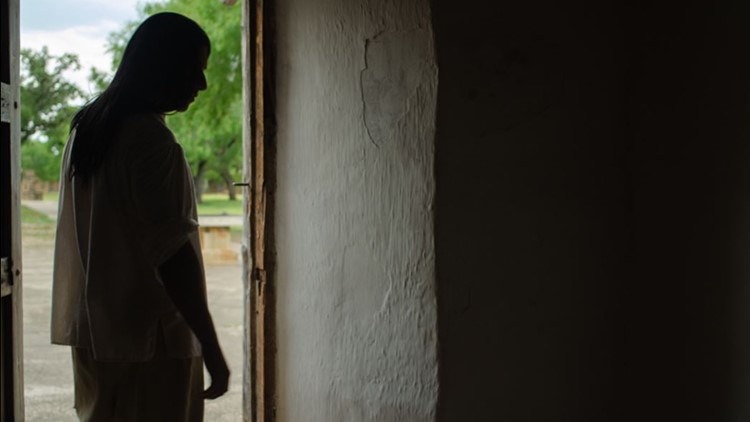SAN ANTONIO — It won’t be the first time filmmaker Marcella Ochoa watches the Blumhouse-produced social thriller she cowrote, “Madres,” on the big screen when she sits down at the historic Guadalupe Theater.
While she attended a premiere screening last year under the bright lights of Hollywood, where Ochoa has spent the last several years pursuing a career in movies, she says Friday’s screening – in her hometown, surrounded by friends and family – will resonate even more.
“I think it's such a beautiful thing, because the Guadalupe, that's the neighborhood both of my parents grew up in,” said Ochoa. “I have a lot of history there in that particular area, in that particular theater.”
“Madres” is one of 85 films selected to screen at CineFestival, the Latinx-centric film festival that returns to the west side for a 43rd year this week. Kicking off Wednesday evening with “Pepe Serna: Life Is Art,” a documentary about the prolific Mexican-American actor, the festival will continue with a variety of shorts and features, comedies and genre fare, locally produced films and indie darlings.
Among the highlights: a showcase of work from San Antonians; Family Day on Thursday, featuring the animated adventure “Ainbo: Spirit of the Amazon”; “Comala,” a country-hopping documentary that sees the director working to learn about his father; and “Jockey,” a quiet Sundance drama about an aging rider.
The goal, says CineFestival Director Eugenio del Bosque – leading programming efforts for a second year – is to create a lineup rooted in the Latino/a experience out of about 200 submitted films, prioritizing south Texas perspectives while remaining flexible to include contextually relevant works.
If those works can tie in a San Antonio angle, all the better. That’s how the lineup came to include the Hollywood film “Jockey,” whose star, Clifton Collins Jr., has ties to the region. And “Madres” isn’t the first film from Ochoa that her hometown festival has showcased.
“These types of connections, we look for them and we try to be smart about including them in the festival,” del Bosque said. “Bigger films that kind of help contextualize the program at large, it's OK (to include it). If we are picky about it, it's just going to be very difficult.”


After going 50% capacity in 2021, del Bosque says they’re making about 250 of the Guadalupe Theater’s 400 seats available this year, while remaining flexible amid a recent uptick in COVID-19 cases. Tickets to individual feature film screenings and short-film blocks are available online now for $8, and the public can get in to any pre-6 p.m. screening on Thursday and Friday (as well as Saturday's Youth Films showcase) for free, though you’re still recommended to book a seat online first.
“We ask (that) folks just book what they are actually going to see,” del Bosque said. “Or you buy your tickets in advance and you don't have to worry about it; there's no paper, you can just come on your phone and we can scan your phone. It just makes things a lot simpler.”
The most hardcore of Alamo City cinephiles, meanwhile, can nab an everything-included CineFestival pass for $40. They’ll have access to the dozens of short films as well full-length efforts like the eerie “Madres”; “What We Leave Behind,” a meditative documentary that premiered at South By Southwest in March; “Earth Mother,” a beguiling blend of comedy and fantasy; and “Cuerpo,” a San Antonio-set tale hat brings gothic atmosphere to south Texas history.
“We don't really have much of a haunted forest or haunted castles here in the area, (but) we do have the missions and whatnot in the woods,” said Mark Zuniga, who wrote and directed “Cuerpo,” his debut. “So this is kind of (exploring) what would a horror story be in this area based on those elements. But it's an 18th-century period drama/horror story of the natives clashing with the Spanish settlers.”
A homegrown film made with homegrown talent
What was once a short Zuniga was writing in an attempt to secure grant money from the local film commission eventually grew into his first full-fledged movie.
Fourteen-hour days weren’t out of the ordinary once the time to shoot came around, the filmmaker adds; he and his small crew (“On an average day, we were probably a team of 10 or 12") had just a few months to present a first cut of “Cuerpo.” Later, as was the case with other filmmakers whether they’re occasional hobbyists or Oscar-winning auters, the pandemic gave him more time than expected to make final tweaks.
On Sunday night, “Cuerpo” will bring down the curtain at CineFestival 2022.
“(I was) deeply humbled when we found that they selected the film to be the closing film for the entire festival,” Zuniga said. “I feel like this is probably the festival that we could have shown at first, to have the premiere here in San Antonio with everyone who helped make it.”


Originally hailing from Mercedes, Texas, just a few miles from the U.S.-Mexico border, Zuniga is an adopted San Antonian who has called the Alamo City home ever since he returned around 2014 from New York, where he attended the Rochester Institute of Technology.
Having become fascinated with image-making ever since his grandfather gifted him with a rangefinder camera – with which he tried “to create a different world through the pictures I took” – Zuniga was now in a place big enough to pursue his passion while still being close enough to family in the Rio Grande Valley. It only helps, he says, that San Antonio’s filmmaking community is a tight-knit one.
“You’ve got the San Antonio Screenwriters Guild, San Antonio Film Society and there's definitely different organizations here too,” he added. “If there's something you want to work on, you definitely can find the people here to help you.”
Pioneering new kinds of stories
Ochoa’s story is a similar one of perseverance, albeit on a large scale.
Having been born in San Antonio, where most of her relatives still live, her family ventured west during her elementary-school years when her father got a new job in San Diego. Living two hours down the road from Los Angeles naturally sparked an interest in the industry.
“I knew I wanted to do something in film, but I didn't know how. I couldn't afford to go to a film school, like USC. I couldn't do any of that,” she said. “And I thought, ‘Well, how do you break in?’”
For her, it would be a well-timed publicity internship with Sony, where she connected with A-list filmmaker Roland Emmerich. That networking flourished into her first gig with the “Independence Day” director’s producing partner, Harold Kloser, as he started up his own company.
It was also an opportunity to see, firsthand, how things are done from start to finish in the Hollywood ecosystem.
“That was better than any film school I could have paid for.”


These would be the years when she would meet her eventual writing partner on “Madres,” Mario Miscione. It would also be the time that horror movies received a shock to the system with Jordan Peele’s Oscar-winning megahit “Get Out,” a film that struck a chord with Ochoa.
“I think that's such an interesting way to do a social justice commentary through a horror lens,” she said. “I thought, ‘One day I'd love to do some sort of social justice commentary, but for my community.'"
The result is “Madres,” an 83-minute movie inspired by the historical horrors of forced sterilization, centered around a pregnant Mexican-American woman’s attempts to assimilate into a northern-California community where she finds herself an outsider.
Like the protagonist in her film, Ochoa began researching the timeline of organized sterilization efforts in the U.S., and was surprised to learn just how close to contemporary times it extended. Driving her subject matter home even further, new allegations of women being coerced into sterilization at ICE facilities surfaced when “Madres” was in post-production.
“What humans do to each other is scarier than any ghost or any made-up creature,” Ochoa said. “I thought, 'This is a story that needs to be told.' It's about my community, and also being a woman. And obviously reproductive rights is such an important issue, still, to this day.”
The CineFestival screening will bring things full circle for Ochoa and “Madres,” given she was in San Antonio on a speaking tour when the call came from Blumhouse that the production company behind “Get Out” was interested in buying her script.
'An experience unto itself'
“Cuerpo” and “Madres” are movies for a particular kind of fright-hungry audience, though that’s far from the only genre of film available at CineFestival this week.
Del Bosque is particularly excited about moviegoers coming to see “Comala,” which he describes as “an outstanding film” that dismantles certain generalizations about Latinos in Texas.
Festival attendees will also have no shortage of comedic fare to choose from, if they’re looking for an escapist reason to visit Guadalupe Theater, which will also host the free-to-attend awards ceremony at festival’s end Sunday at 6:30 p.m.
"I am a firm believer that your reality will expand if you expose yourself to audiovisual material that is not going to come to you easily," the festival director says.
Ultimately, del Bosque says, the success of CineFestival continues to be measured in the people who take time to visit the Guadalupe Cultural Arts Center, and an area of town “that’s historically underserved when it comes to culture.”
“It's a historical neighborhood, and it's full of life,” he said. “It really is an experience unto itself. You're entering an atmosphere that, beyond whatever we're doing that day, it really feels like something greater than just coming to see a movie.”
CineFestival runs Wednesday through Sunday at the Guadalupe Cultural Arts Center; tickets are available online now, and starting Wednesday at the venue's box office.



